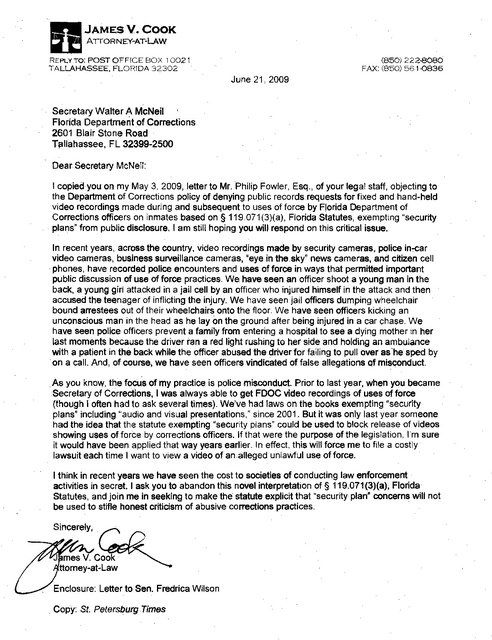Cook Ltr Objection to Fldoc Denial of Public Record Requests for Video 2009
Download original document:

Document text

Document text
This text is machine-read, and may contain errors. Check the original document to verify accuracy.
l1li JAMES V. COOK a.c ATTORNEY-AT-LAW REPLY TO: POST OFFICE BOX 10021 TALLAHASSEE, FLORIDA 32302 (850) 222-8080 FAX: (850) 561-0836 June 21,2009 Secretary Walter A McNeil Florida Department of Corrections 2601 Blair Stone Road Tallahassee, FL 32399-2500 Dear Secretary McNeil: I copied you on my May 3,2009, letter to Mr. Philip Fowler, Esq., of your legal staff, objecting to the Department of Corrections policy of denying public records. requests for fixed and hand-held video recordings made during and subsequent to uses of force by Florida Department of Corrections officers on inmates based on § 119.071 (3)(a), Florida Statutes, exempting "security plans" from public disclosure. I am still hoping you will respond on this critical issue. In recent years, across the country, video recordings made by security cameras, police in-:-car video cameras, business surveillance cameras, "eye in the sky" news cameras, and citizen cell phones, .have recorded police encounters and uses of force in ways that permitted important public discussion of use of force practices. We have seen an officer shoot a young man in the back, a young girl attacked in a jail cell by an officer who injured himself in the attack and then accused the teenager of inflicting the injury. We have seen jail officers dumping wheelchair bound arrestees out of their wheelchairs onto the floor. We have seen officers kicking an unconscious man in the head as he lay on the ground after being injured in a car chase. We have seen police officers prevent a family from entering a hospital to see a dying mother in her last moments because the driver ran a red light rushing to her side and holding an ambulance with a patient in the back while the officer abused the driver for failing to pull over ashe sped by on a call. And, of course, we have seen officers vindicated of false allegations of misconduct. As you know, the focus of my practice is police misconduct. Prior to last year, when you became Secretary of Corrections, I was always able to get FDOC video recordings of uses of force (though loften had to ask several times). We've had laws on the books exempting "security plans" inclUding "audio and visual presentations," since 2001. But it was only last year someone had the idea that the statute exempting "security plans" could be used to block release of videos showing uses of force by corrections officers. If that were the purpose of the legislation, I'm sure it would have been applied that way years earlier. In effect, this will force me to file a costly lawsuit each time I want to view a video of an alleged unlawful use of force. I think in recent years we have seen the cost to societies of conducting law enforcement activities in secret. I ask you to abandon this novel interpretation of § 119.071(3)(a), Florida Statutes, and join me in seeking to make the statute explicit that "security plan" concerns will not be used to stifle honest criticism of abusive corrections practices. Sincerely, Enclosure: Letter to Sen. Fredrica Wilson Copy: St. Petersburg Times





